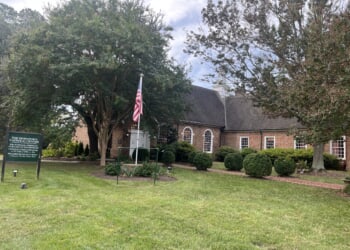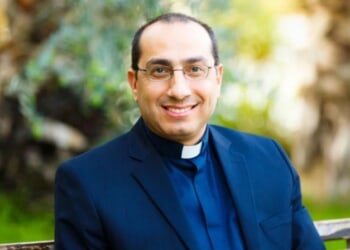In the 4th century A.D., Ethiopia became the world’s second Christian nation, preceded only by Armenia. Though its historicity is questionable, the 14th-century Kebra Nagast tied Prince Ermias Sahle Selassie’s family to the Old Testament’s Queen of Sheba, who is recorded as having borne a son by Solomon in the Book of Kings. In the centuries since, Ermias’s ancestors led Ethiopia as the House of Solomon.
The Ethiopian Empire was the only nation in Africa to maintain its complete independence during the age of empires. From 1916 to 1974, Ermias’s grandfather, Haile Selassie, was the most powerful man in the nation, ruling as emperor from 1930 onwards. However, things came crashing down with a bloodstained communist coup in 1974.
The ensuing military government unleashed the worst of Marxist terror on the nation as it murdered the emperor and ravaged Ethiopia’s Orthodox Church. Prince Ermias, already heir due to the untimely death of his father, was only 14 and spared a tragic fate through the luck of studying abroad in Europe at the time.
The nation’s destiny has remained uncertain ever since, even with the fall of communism. Since 1975, Ermias has been the titular head of the Solomonic Dynasty and president of the now-United States-based Crown Council of Ethiopia. As his nation has grown from 24 million in the tragic days of the 1970s to 130 million today, the Crown Council has continued to advocate for the protection of the principles that once made Ethiopia a shining light within a troubled continent.
Though it maintains itself as the heir to a long-governing institution, Prince Ermias clarified that the Crown Council of Ethiopia today focuses on “propping up Ethiopian history and identity” rather than fighting for an immediate restoration of the throne. In that capacity, it oversees several charitable foundations that sponsor development in Ethiopia and of the Ethiopian diaspora in the West.
An Overlooked Crisis
Prince Ermias lamented that “Ethiopia has really been, throughout international media, largely neglected.” The country was wracked by a civil war from 2020 until 2022 that claimed as many as 800,000 lives. That is over 12 times as many casualties as the ongoing Israel–Hamas War. He fears that “[Ethiopia’s] very existence is in question because of our own internal implosion based on ethnic strife.”
Amidst this ongoing crisis, “we don’t have a voice in mainstream media,” he told The American Spectator. Despite extensive reports from on the ground, the lack of coverage elsewhere made it seem to the Prince “that we are simply talking to one another and not getting the word out to the world community.”
Approaching a solution to this crisis, Prince Ermias looks to the federalism of the United States or Switzerland as a model. He told The American Spectator that he believes “Ethiopia as a nation should always remain federated, but on an administrative basis” rather than drawing regional borders according to ethnic lines, which incites separatism.
In addition, he placed the blame for the state of Ethiopia squarely at the feet of the communist regime that murdered his grandfather. The “communist government was really brutal,” in his words. It oversaw mass starvation, Red Terror campaigns, and finally a bloody civil war. In total, communism in Ethiopia has led to 725,000 deaths and the devastation of one of the world’s oldest cultures.
Ermias described the communist regime to The American Spectator as only “interested in its own power.” Faced with this situation, Ethiopia’s diverse populace focused on ethnic loyalties in the ensuing civil war, which resulted in a federal system. However, Ermias argued that the Tigray People’s Liberation Front, a nationalist militant group, was “literally the top dog running the show” under this arrangement.
The post-communist regime was neither one of national unity, as the House of Solomon had offered, nor democracy. Ermias describes the ethnic politics that plagued the nation, particularly from the TPLF, after the transition from communism as leading to a “very corrupt and dictatorial regime” where “people naturally rebelled.”
In contrast, Ermias and the Crown Council hope to merge the stability of a constitutional monarchy with democratic institutions. He told The American Spectator that “we have to aim for a better sense of representation and democracy” and can learn from the United States while also learning “from the mistakes.”
Converging Economic and Security Interests
Ermias, who has been a resident of the United States for four decades, expressed hope to The American Spectator about prospects for partnerships between America and Ethiopia. He views his nation as “potentially very rich” despite humanitarian challenges and strife. Historically, “Ethiopia had a very central role in Africa.” Addis Ababa, the nation’s capital, hosts the African Union, an institution similar to the European Union.
Under the rule of his ancestors, Ethiopia maintained a strong partnership with the United States. Since then, Prince Ermias noted that “the U.S. has been always at the forefront of humanitarian help” even when “because of the civil conflict, we have not been able to farm and to produce food.” However, a stable Ethiopia could become a key economic partner. Under Emperor Haile Selassie, Ethiopian Airways was formed as part of an economic partnership that Prince Ermias described as a “shining example” of mutual benefit.
In addition to economics, Ermias believes Ethiopia can play a key role in American national security, serving as “an anchor for stability in that part of the world.” While “an engine for economic development for the region,” as it was prior to 1974, Ethiopia also maintains a “strategic location” near the Red Sea, where it can “play a role in stabilizing.”
The Trump administration has reacted forcefully with strikes on Islamist Houthi forces in Yemen that have plagued Red Sea shipping. Prince Ermias noted that a Red Sea crisis “happened before with Somali pirates.” Both occurred after Ethiopia lost its port access to the Red Sea in 1991, which it has attempted to regain via treaty ever since. As a consequence, no stable regional power is able to police the waters with its own navy.
Prince Ermias argued to The American Spectator that “if there was an effective Navy in the region, it would be a solution to the pirate crisis there.” As a result, American trade interests and national security concerns about Islamic extremism converge with Ethiopia’s interest in control of a port. Until then, piracy concerns from Somalia, Yemen, or elsewhere, “will continue unless there is a coordinated regional security agreement on how to protect the Red Sea.”
The issue of Somaliland briefly came up as well in light of the increasingly likely possibility of international recognition from the Trump administration. Prince Ermias noted that “Ethiopia was engaged with recognizing Somaliland earlier on last year” and said to The American Spectator that “my sense is, they’ve been relatively stable apart from the other parts of Somalia.”
Prince Ermias noted to The American Spectator that “traditionally Ethiopia has had a very close relationship with the United States and Europe,” in part due to their shared “Judeo-Christian” values. However, Ethiopia under Prime Minister Abiy Ahmed today is increasingly close to China, and “the Chinese were very astute.”
China has spent billions on infrastructure projects across Africa. In the process, they have forged close relations with the fastest-growing nations on Earth — and saddled them with immense debt. Ethiopians have “seen and witnessed the work they’ve done in terms of infrastructure,” Ermias says, but notes the issue that these “debt burdens” could pose.
Values of Faith
Ethiopia today is approximately two-thirds Christian and a third Muslim. Pew Research has found Ethiopian Christians to be the most active group of Christians in the world, with 98 percent saying religion is important to their lives and 78 percent attending religious services weekly. The Ethiopian Orthodox Church, the largest church in the Oriental Orthodox world, remains the largest faith in the nation. Its followers comprise roughly 44 percent of the country. Another 20 percent are members of Protestant churches, primarily Pentecostal or members of Ethiopia’s large Lutheran church, whose ten million members are closely associated with the Lutheran Church-Missouri Synod in the United States.
Thus, “we are a multi-ethnic, multi-religious society,” Prince Ermias was clear to state to The American Spectator that “Ethiopia is a Judeo-Christian country.” He sees Ethiopia’s Orthodox Church as having “a very major role in trying to heal the wounds and create unity among Ethiopian people,” pointing to “the example of Hungary post-communism, [where] the Catholic Church took over social services and was in a position to distribute and develop social services through its population.”
However, Ermias lamented to The American Spectator that “the Church has been silenced since the 1974 communist revolution” and remains “a silenced institution up to this day that is not utilizing its potential.” Yet, even still, it is a “living faith” and “remains one of the only important institutions that is part and parcel of Ethiopian people throughout the country.” Thus, “they can be an engine for social development” and have demonstrated this with “their work in developing health clinics, schools, learning institutions.”
Ermias mourned to The American Spectator that “the communists in ‘74 came and shut down the church,” resulting in “the displacement of families and family values.” However, he hopefully noted that, since then, “the older generation are now also raising their children with faith” and the thriving of Ethiopian Christianity is a “testimony not only to the faith, but that families are also getting engaged.”
The conversation then turned to the Ethiopian diaspora, over 3 million worldwide and 300,000 in the United States. In particular, Prince Ermias noted their growing influence in American politics, where “Ethiopian constituents are much more conservative by nature.” Describing their political priorities, he emphasized that “they would like to see the abolition of same-sex marriages and the teaching of LGBTQ issues in schools.” This issue was prominent in the recent Supreme Court case Mahmoud v. Taylor, where Ethiopian Orthodox parents served as co-plaintiffs.
Ermias regretfully stated to The American Spectator that in the aftermath of the communist takeover of the nation, “everybody came here [the United States] with a hope that they were fleeing one set of problems only to come and confront another one” when “parents come to me complaining that their [female] children came to them saying ‘I’m a man,’” which has been “very disturbing.”
The Ethiopian community in America once voted overwhelmingly Democrat. However, Ermias noted that “in the last election, they voted Republican because of the issues I just mentioned.” The large swing gave Donald Trump a majority of the vote among Americans of Ethiopian descent. Explaining this to The American Spectator, Ermias said that “they were very despondent that faith took a back seat position, that everything goes, that the values that had inspired them to come here were dissipating underneath them.”
The experience of Ethiopians in America echoes the historic experience of Americans in Ethiopia, who served as Protestant missionaries or diplomats. All have discovered a fact that Prince Ermias believes to remain deeply prescient, that “Christian heritage is the fiber that really holds the bridge between America and Ethiopia.”
With its population and the importance of its geopolitical place continuing to grow, Ethiopia will only become more important as a possible partner for the United States. Prince Ermias and the Crown Council believe that “the concepts of democracy, tolerance, and rule of law can be transferred through these engagements” in a renewed national friendship that could be more important than ever.
To listen to Prince Ermias’s interview in full, click here.
Shiv Parihar is an editorial intern at the American Spectator. You can follow him on X @ShivomMParihar.
READ MORE:
How Richard Nixon Became Cool Again
Ilhan Omar’s Father Served a Communist-Islamist Regime Before Becoming a Refugee in Minnesota





![Gavin Newsom Threatens to 'Punch These Sons of B*thces in the Mouth' [WATCH]](https://www.right2024.com/wp-content/uploads/2025/08/Gavin-Newsom-Threatens-to-Punch-These-Sons-of-Bthces-in-350x250.jpg)
![ICE Arrests Illegal Alien Influencer During Her Livestream in Los Angeles: ‘You Bet We Did’ [WATCH]](https://www.right2024.com/wp-content/uploads/2025/08/ICE-Arrests-Illegal-Alien-Influencer-During-Her-Livestream-in-Los-350x250.jpg)







